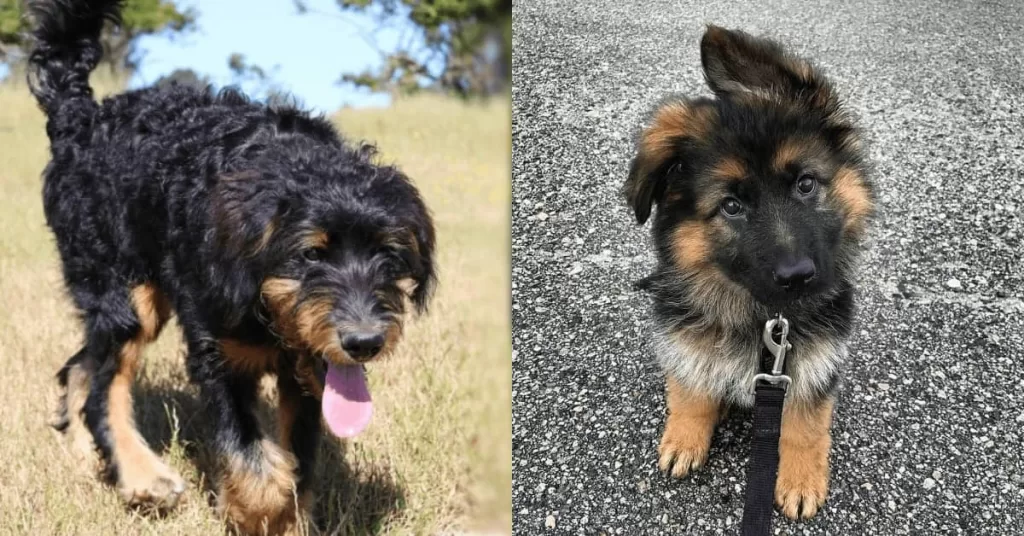Bernedoodle dog breed is considered as a mid-size dog breed whereas German shepherds are considered as medium to large breed dogs.
Table of Contents
But if you ask me if they can get along with each other, my answer is Yes!!
As long as a pet is properly socialized with other dogs from their puppyhood, no dog will have a genetic rivalry with another breed of dog.
Here are some major differences we can see in both dogs.
| Size | Small Large Medium | Large |
| Weight | 10-90 pounds (4.5-41 kg) | Male: 66-88 pounds (30-40 kg), Female: 49-71 pounds (22-32 kg) |
| Avg. Weight | 50 pounds (23 kg) | Male: 77 pounds (35 kg), Female: 60 pounds (27 kg) |
| Height | 10-29 inches (25.5-74 cm) | Male: 24-26 inches (60-65 cm), Female: 22-24 inches (55-60 cm) |
| Avg. Height | 19 inches (48 cm) | Male: 25 inches (62.5 cm), Female: 23 inches (57.5 cm) |
Hair & Care – Bernedoodles vs German Shepherds
| Coat | Curly Wavy Straight | Fuzzy |
| Colors | Black Black & White Brown & Black Tricolor | Silver Tan Red Black |
| Grooming | Average: The Bernedoodle requires average grooming effort. | Average: The German Shepherd requires average grooming effort. |
| Shedding Level | Bernedoodles shed none to minimal. | German Shepherds are heavy shedders. |
The Bernedoodle is basically a new hybrid that was created when the Bernese mountain dog crossed with the poodle.
Like many doodle dogs, this puppy is known as a clever and loyal yet goofy dog which makes it a great family pet for all types of households.
As we all know and German shepherd characteristics and traits have already been discussed, let’s talk a little more about Bernedoodle.
Bernedoodles Features
As a mixed breed, it’s hard to imagine how the worst of the Bernedoodle will turn out. A standard Bernedoodle is raised with a Bernice Mountain Dog or poodle as a sire or dam because of their size.
For a mini, Bernice Mountain Dog Dam and Poodle Sire. Since the smaller Bernedoodle is second or next generation, the dam and sire are the same sizes and again they are interchangeable.
Also Read Irish wolfhound and German shepherd Mix: Complete Guide before Adopting.
For a Bernedoodle puppy, the costs would be between $2,500 and $ 5,000. They are expensive because they are a rare breed and are also known as designer breeds.
However, the color, size, and generation of the Bernardool also play a role in the price tag. Always remember to buy from a reputable breeder as they can give accurate information regarding your Bernodole parents.
Bernedoodles Appearance

The size of your Bernedoodle is affected by any variety of breeds you buy and also the Best Dog Food for Bernedoodle you choose. We mentioned above that it is difficult to comprehend the size and characteristics of your Bernedoodle but you can make an educated assessment of their parents’ size and forms.
It is always advisable to buy from reputed breeders who exhibit Bernedoodle puppies for sale.
Standard Bernedoodle puppies do not fully mature between 12-18 months, while mini and small puppies usually reach full maturity by 12 months of age.
A standard adult is between 23-29 in height and weighs approximately 70-90 pounds. The Mini is 18-22 ″ long and weighs 25-49 pounds and the smaller 12-17 ”and 10-24 pounds.
Unlocking the Perfect Pairing: Finding Compatibility for Your Bernedoodles
Thinking about bringing this dog into your life? You’re in for a treat! These fluffy companions are known for their friendly and lovable nature. But, compatibility with other dog breeds is crucial to ensure harmony in your furry family.
Understanding Compatibility
While Bernedoodles are generally friendly and adaptable, there are a few considerations to keep in mind when introducing them to other canine friends. Let’s dive into some insights:
1. Energy Levels: Every dog has its own energy level. Bernedoodles are moderately active, and they tend to match well with other breeds of similar energy. For instance, Labs and Retrievers, with their high activity levels, might be a bit too lively for Bernedoodles. It’s like pairing a marathon runner with a yoga enthusiast – not always an ideal match.
2. Independence: Some dog breeds are more independent than others. Terriers, for example, often have an independent streak. While independence can be a virtue, it may not mesh well with the sociable nature of a Bernedoodle. Think of it as trying to blend the personality of a lone wolf with that of a social butterfly.
3. Compatibility Test: To gauge compatibility, consider arranging a meet-up in an enclosed area, like your backyard. Observe their interactions closely. If your dog seems anxious or frightened around the Bernedoodle, it’s a sign that the chemistry might not be right.
4. Size Matters: Size compatibility is vital. A small toy Bernedoodle may not be the best roommate for a Bull Mastiff, considering the size difference. It’s like trying to fit a puzzle piece into the wrong slot – it just doesn’t work.
5. Ideal Companions: If you’re searching for the perfect companions for your Bernedoodle, several breeds often complement their temperament. Breeds known for friendliness, intelligence, and lovability, such as Golden Retrievers, Poodles, or even another Bernedoodle, can make excellent matches.
6. Training and Patience: Building strong bonds between your Bernedoodle and other dogs may require some training and patience. With dedication, you can foster a lifelong friendship built on mutual love and respect.
What Dogs Aren’t Compatible with German Shepherds?
Choosing a dog breed is an important decision that can impact your life and the life of your furry friend for years to come. German Shepherds, known for their intelligence, loyalty, and versatility, are a popular choice among dog enthusiasts. However, not all dog breeds are compatible with the temperament and characteristics of German Shepherds. This essay explores the traits and temperament of German Shepherds and identifies dog breeds that are typically not compatible with them.
The Traits and Temperament of German Shepherds:
German Shepherds are renowned for their remarkable qualities. They are highly intelligent, making them easy to train and suitable for various roles, from police work to service dogs. Their loyalty and protective instincts make them excellent family pets, as they are known to form strong bonds with their owners. They are also known for their agility and athleticism, which can lead to a need for mental and physical stimulation.
However, German Shepherds also possess a few traits that potential owners should be aware of. They can be wary of strangers, making them excellent watchdogs but potentially aloof with new people. Their protective instincts, if not properly channeled, can sometimes lead to overprotectiveness or aggression.
Breeds Incompatible with German Shepherds:
- Chihuahua: Chihuahuas are known for their tiny size and often have a spirited, independent personality. Their small stature and boldness can clash with the protective and assertive nature of German Shepherds. The size difference alone can make interactions challenging, and a German Shepherd’s protective tendencies may not be well-received by a Chihuahua.
- Pomeranian: Pomeranians are lively, affectionate, and sometimes possessive of their owners. German Shepherds, with their protective nature, may perceive this possessiveness as a threat. The size difference can also be problematic, as German Shepherds are significantly larger.
- Shih Tzu: Shih Tzus are known for their affectionate and gentle disposition. However, their sensitivity may not align well with the assertive and sometimes dominant behavior of German Shepherds. The size contrast can also pose challenges, potentially making the Shih Tzu feel overwhelmed.
- Bulldog: Bulldogs are known for their easygoing nature but can be stubborn. The Bulldog’s stubbornness might not easily yield to a German Shepherd’s assertiveness, potentially leading to conflicts. Additionally, the Bulldog’s physical limitations can make interactions with a larger, more active German Shepherd challenging.
- Dachshund: Dachshunds are characterized by their playful and independent nature. Their playful antics may not always resonate with the serious and protective demeanor of German Shepherds. Their small size can also make them vulnerable in interactions.
Conclusion
Bernedoodle originated in Canada but the German Shepherd originated in Germany. The Bernedoodle grows 24 cm / 9 inches shorter than the German Shepherd.
Both Bernedoodle and German Shepherd weighed almost the same weight. Both the Bernedoodle and the German Shepherd have almost the same lifespan.
Bernedoodle may have a smaller litter size than German Shepherds. Bernedoodle needs moderate maintenance. But the German Shepherd needs less maintenance.

